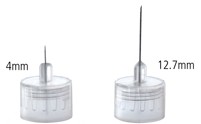Injector pen






Injector pen
An injector pen, also known as an insulin pen or auto-injector, is a medical device used to deliver medication through the subcutaneous route. It is commonly used for the administration of insulin in the treatment of diabetes mellitus, but it can also be used for other medications such as growth hormone and epinephrine.
Design and Components[edit]
An injector pen typically consists of the following components:
- Pen cap: Protects the needle and prevents contamination.
- Needle: A fine, short needle that delivers the medication.
- Cartridge: Contains the medication to be injected.
- Dose selector: Allows the user to set the desired dose.
- Injection button: When pressed, it releases the medication.
- Display window: Shows the selected dose.
Types of Injector Pens[edit]
There are two main types of injector pens:
- Disposable pens: These come pre-filled with medication and are discarded after use.
- Reusable pens: These have replaceable cartridges and can be used multiple times.
Usage[edit]
Injector pens are designed to be user-friendly and are often used by patients for self-administration of medication. The steps for using an injector pen typically include: 1. Attaching a new needle. 2. Priming the pen to remove air bubbles. 3. Setting the desired dose. 4. Injecting the medication by pressing the injection button.
Advantages[edit]
Injector pens offer several advantages over traditional syringes and vials:
- Ease of use: They are easier to handle, especially for individuals with limited dexterity.
- Portability: Compact and convenient to carry.
- Accuracy: Dose selectors ensure precise dosing.
- Reduced pain: Fine needles cause less discomfort.
Common Medications Delivered by Injector Pens[edit]
- Insulin for diabetes mellitus
- Growth hormone for growth disorders
- Epinephrine for severe allergic reactions (anaphylaxis)
- Fertility drugs for assisted reproductive technology
Related Pages[edit]
See Also[edit]
Ad. Transform your life with W8MD's Budget GLP-1 injections from $75


W8MD offers a medical weight loss program to lose weight in Philadelphia. Our physician-supervised medical weight loss provides:
- Weight loss injections in NYC (generic and brand names):
- Zepbound / Mounjaro, Wegovy / Ozempic, Saxenda
- Most insurances accepted or discounted self-pay rates. We will obtain insurance prior authorizations if needed.
- Generic GLP1 weight loss injections from $75 for the starting dose.
- Also offer prescription weight loss medications including Phentermine, Qsymia, Diethylpropion, Contrave etc.
NYC weight loss doctor appointmentsNYC weight loss doctor appointments
Start your NYC weight loss journey today at our NYC medical weight loss and Philadelphia medical weight loss clinics.
- Call 718-946-5500 to lose weight in NYC or for medical weight loss in Philadelphia 215-676-2334.
- Tags:NYC medical weight loss, Philadelphia lose weight Zepbound NYC, Budget GLP1 weight loss injections, Wegovy Philadelphia, Wegovy NYC, Philadelphia medical weight loss, Brookly weight loss and Wegovy NYC
|
WikiMD's Wellness Encyclopedia |
| Let Food Be Thy Medicine Medicine Thy Food - Hippocrates |
Medical Disclaimer: WikiMD is not a substitute for professional medical advice. The information on WikiMD is provided as an information resource only, may be incorrect, outdated or misleading, and is not to be used or relied on for any diagnostic or treatment purposes. Please consult your health care provider before making any healthcare decisions or for guidance about a specific medical condition. WikiMD expressly disclaims responsibility, and shall have no liability, for any damages, loss, injury, or liability whatsoever suffered as a result of your reliance on the information contained in this site. By visiting this site you agree to the foregoing terms and conditions, which may from time to time be changed or supplemented by WikiMD. If you do not agree to the foregoing terms and conditions, you should not enter or use this site. See full disclaimer.
Credits:Most images are courtesy of Wikimedia commons, and templates, categories Wikipedia, licensed under CC BY SA or similar.
Translate this page: - East Asian
中文,
日本,
한국어,
South Asian
हिन्दी,
தமிழ்,
తెలుగు,
Urdu,
ಕನ್ನಡ,
Southeast Asian
Indonesian,
Vietnamese,
Thai,
မြန်မာဘာသာ,
বাংলা
European
español,
Deutsch,
français,
Greek,
português do Brasil,
polski,
română,
русский,
Nederlands,
norsk,
svenska,
suomi,
Italian
Middle Eastern & African
عربى,
Turkish,
Persian,
Hebrew,
Afrikaans,
isiZulu,
Kiswahili,
Other
Bulgarian,
Hungarian,
Czech,
Swedish,
മലയാളം,
मराठी,
ਪੰਜਾਬੀ,
ગુજરાતી,
Portuguese,
Ukrainian